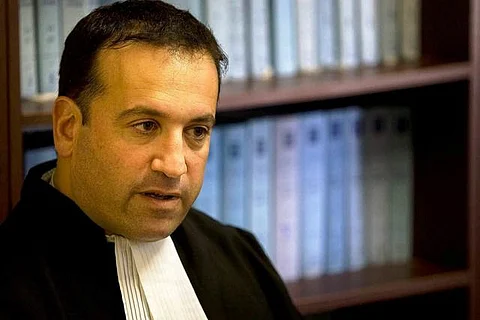
- NEWS
- the EDIT
- COMMENTARY
- BUSINESS
- LIFE
- SHOW
- ACTION
- GLOBAL GOALS
- SNAPS
- DYARYO TIRADA
- MORE

British-Israeli lawyer Nicholas Kaufman has officially been named as the lead defense counsel of former president Rodrigo Duterte in his crimes against humanity case before the International Criminal Court (ICC).
The public redacted version of Kaufman’s appointment was released on Wednesday, a day after his first visit to the former president, who is currently detained at the ICC Detention Center in Scheveningen, The Hague, Netherlands.
“On 17 March 2025, the Registry met with Mr. Duterte and he signed the appointment of counsel form whereby he confirms his appointment of Mr. Kaufman as his Counsel in the proceedings before the International Criminal Court,” the document read.
“On the same day, Mr. Kaufman accepted the mandate, as required by article 11 of the Code of Conduct for Counsel (‘the Code’) as well as the solemn Undertaking required by Article 5 of the Code,” it added.
Kaufman met Duterte for the first time on Tuesday (March 18). He was also scheduled to meet former secretary Salvador Medialdea, who was rushed to the hospital before the meeting.
‘Acquittal at earliest possible time’
Kaufman, the British-Israeli lawyer representing former President Rodrigo Duterte, has expressed confidence that his client will be acquitted at the earliest possible stage of his alleged crimes against humanity case before the international tribunal.
"I'm very confident in the strongest defense possible, and I'm very confident that he will be acquitted—indeed, even at the earliest stage possible," Kaufman told reporters in an ambush interview following a brief visit with Duterte on Wednesday.
Kaufman, who will lead Duterte’s legal team before the international tribunal, declined to elaborate on the legal strategies they will employ to prove the former president’s innocence.
"We will be filing all necessary applications in due course. I am not prepared to comment on a defense strategy at this moment," he said.
‘Rights denied’
Kaufman, an experienced lawyer and known for handling high-profile cases before the ICC, highlighted Duterte’s arrest in the Philippines as a key argument for the defense.
"He was completely denied all his rights in the Philippines. That will obviously be an argument in the course of this defense," he stated.
Duterte was arrested at Ninoy Aquino International Airport on March 11 upon his return from Hong Kong, where he attended a Kingdom of Jesus Christ event with overseas Filipino workers.
On the same day, he was flown to The Hague, where the ICC is based, to face charges of murder linked to his anti-illegal drugs crackdown in the Philippines between November 1, 2011, and March 16, 2019.
Duterte’s supporters in the Philippines, particularly his allies in the Senate, have claimed that his arrest was illegal, citing the country’s withdrawal from the Rome Statute in 2019.
President Ferdinand Marcos Jr., however, rejected allegations of irregularity, asserting that Duterte’s arrest was carried out in compliance with the Philippines' obligations to the International Criminal Police Organization (Interpol).
"Interpol asked for help, and we obliged because we have commitments to Interpol that we must fulfill. If we don’t do that, they will no longer assist us in cases involving Filipino fugitives abroad," Marcos explained.
"This is what the international community expects from us as a democratic nation and a member of the global community," he added.
Who is Kaufman?
Kaufman, an ICC-accredited lawyer, has extensive experience in international law, having previously defended figures accused of war crimes and human rights violations.
Educated at the University of Cambridge, Kaufman is not just a trial lawyer but also a legal strategist specializing in litigation, crisis public relations, and reputation management—a skill set that could prove crucial in Duterte’s case.
Prior to handling Duterte’s controversial case, he served as co-counsel for Jean-Pierre Bemba, the former Vice President of the Democratic Republic of the Congo. He was charged by the ICC with crimes against humanity in relation to the atrocities committed by his militia, the Movement for the Liberation of Congo, in the Central African Republic between 2002 and 2003.
Unlike Duterte’s arrest, which happened hours after the arrest warrant was issued by the international tribunal, Bemba was surrendered to the court after two months in 2008.
After nearly 10 years since his arrest, the ICC found Bemba guilty on five counts of war crimes and crimes against humanity, including murder, rape, and pillaging. The international tribunal sentenced him to 18 years of imprisonment.
However, in a surprise decision in 2018, the ICC Appeals Chamber overturned Bemba’s conviction, noting that the court had “erroneously convicted Bemba for specific criminal acts that were outside the scope of the charges as confirmed.”
Kaufman was also involved in the legal defense of Aisha Gaddafi, daughter of Libya’s former president Muammar Gaddafi, who was killed by the rebel forces of the National Liberation Army in 2011.
Although Aisha was not formally charged before the ICC, Kaufman was widely credited for protecting her legal rights and procedural battles after she was subjected to United Nations sanctions, including asset freezes and travel bans.
Despite attempts, the petitions to lift sanctions against Aisha were not lifted.
Kaufman also demanded that the international tribunal investigate the killing of Libya’s former strongman, on behalf of his client, and questioned the capacity of the government that took control of power.
His most recent high-profile case involved Maxime Mokom Gawaka, a militia leader from the Central African Republic, though his representation there ended due to a conflict of interest.
